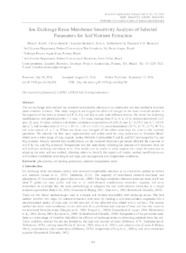Ion exchange resin membrane sensitivity analysis of selected parameters for soil nutrient extraction.
Ion exchange resin membrane sensitivity analysis of selected parameters for soil nutrient extraction.
Author(s): KROTH, P. L.; BORTOLON, L.; SCHLINDWEIN, J. A.; BORTOLON, E. S. O.
Summary: The ion exchange resin method has received considerable attention as an alternative soil test method to evaluate plant available nutrients. This study sought to investigate the effect of changes to the resin standard method in the capacity of the resin to extract soil P, K, Ca, and Mg in soils with different texture. We tested the following modifications: soil grinding levels (< 2 mm; < 0.3 mm), shaking time (8 h; 16 h; 24 h), reciprocation level (12.5 rpm; 25 rpm; 50 rpm), solution and elution saturation concentration (0.25/0.25 mol L-1; 0.5/0.5 mol L-1; 1.0/1.0 mol L-1), soil:solution ratio (1:5 v:v; 1:10 v:v; 1:16 v:v; 1:25 v:v), room temperature (10 oC, 15 oC, 25 oC, 40 oC), and resin amount (1 n; 2 n). When one factor was changed all the others were kept the same as the standard procedure. We selected the five most representative soil orders used for crop production in Southern Brazil which have a wide range of clay, organic matter, Mehlich-1 extractable P and K, and KCl exchangeable Ca, and Mg contents. Results showed that modifications on the standard extraction procedure affected the amounts of soil P, K, Ca, and Mg extracted. Temperature was the main factor affecting the amount of P extracted from the soil with ion exchange membrane resin. Our results can be useful to other regions that might be interested in adopting the resin soil test method, allowing others to identify the impacts of similar method modifications on soil nutrient availability according to soil type, soil management, and temperature conditions.
Publication year: 2016
Types of publication: Journal article
Keywords: Análise do solo, Fósforo, Phosphorus, Potassium, Potássio, Resina, Resins, Soil analysis
Observation
Some of Embrapa's publications are published as ePub files. To read them, use or download one of the following free software options to your computer or mobile device. Android: Google Play Books; IOS: iBooks; Windows and Linux: Calibre.
Access other publications
Access the Agricultural Research Database (BDPA) to consult Embrapa's full library collection and records.
Visit Embrapa Bookstore to purchase books and other publications sold by Embrapa.

